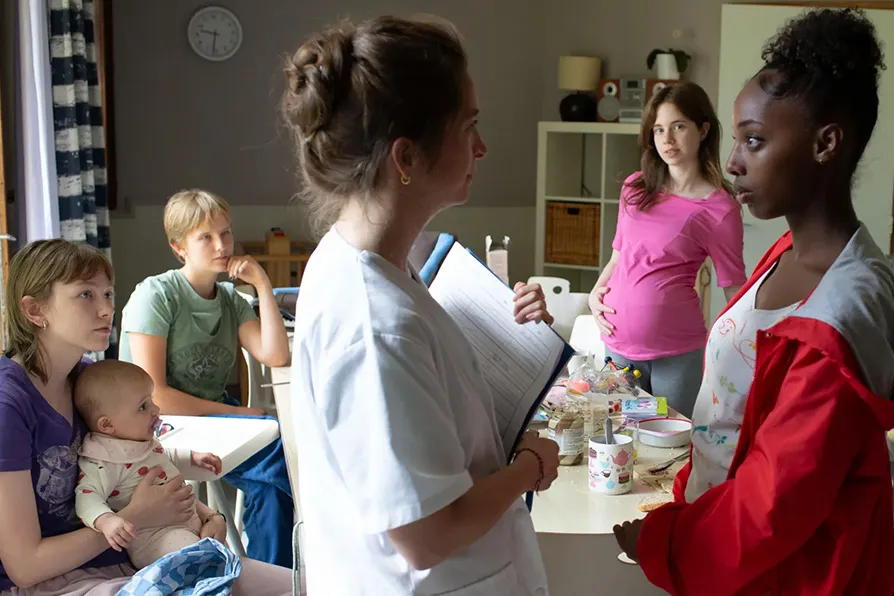SUE TURNER is fascinated by a book that researches who the largely immigrant workforce were that built the Empire State
RITA DI SANTO reports on the films from Iran, Spain, Belgium and Brazil that won the top awards

 Young Mothers, directed by Jean-Pierre and Luc Dardenne [Pic: IMDb]
Young Mothers, directed by Jean-Pierre and Luc Dardenne [Pic: IMDb]
DISSIDENT Iranian director Jafar Panahi’s A Simple Accident won the Palme d’Or at this year’s Cannes Film Festival. After being banned from leaving his country for 15 years, he was present in person to collect the award. His films have consistently explored pressing social and political issues in Iran, resonating powerfully, and shedding light on the complexities of life under oppressive regimes.
A Simple Accident, shot clandestinely, is an ebullient film of vital political significance. Set on the hills of Tehran, it begins with an ordinary car journey that takes an unexpected turn. On the way home one night, a man accidentally hits a dog, sparking a chain of consequences.
He takes his car to a local garage, where the owner, Vahid, suspects the man is not the respectable family man he seems, but rather a regime inspector who tortured him during imprisonment. Vahid kidnaps the suspect and keeps him in the back of his van.
The film is a tense revenge thriller with a touch of absurd humour, building into a stark condemnation of abusive power and its long-lasting effects. It is Panahi’s most personal and dark film, using the story to explore the ripple effects of autocracy, as each character faces choices between revenge and morality. This film demonstrates that despite his detention, he remains determined to create movies that respond to his country’s politics.
Among other awards was a tie the Jury Prize. Masha Schillinski’s Sound Of Falling depicts the lives of four girls growing up on a rural farm over different decades, capturing the essence of childhood and the passage of time. She shares her award with Oliver Laxe’s Sirat, one of two movies in competition from Spain.
Sirat follows a father and his son who arrive at a remote rave deep in the mountains of southern Morocco, searching for Mar — daughter and sister — who has been missing for months at an endless rave party. Immersed in electronic music and a raw freedom alien to them, they tirelessly distribute her photo. Hope fades, but they persist, following a group of ravers to one last party in the desert. As they delve deeper into the vastness, the journey confronts them with their own limits. The radio warns of escalating wars, depleting resources and a breakdown in diplomatic relations.
It is a film that lingers with you after the credits, opening many reflections. It’s a strong comeback for Spanish cinema.
The most significant film came from Jean-Pierre and Luc Dardenne, who won Best Screenplay for a tender portrait of young mothers. The brothers have often focused on young protagonists from underprivileged backgrounds.
Young Mothers follows five young mothers in a maternity home. Set in the post-industrial area around Liege in eastern Belgium, the Dardenne brothers stay close with their camera, almost stalking the young protagonists. It’s a slice of social realism that views reality with light and hope. Each mother has a unique story, building a powerful emotional impact, highlighting their fragility and strength. Before filming, the brothers researched a maternity home near Liege, where single mothers find shelter. The film focuses on communal life in this place, the meals, the babies’ baths, discussions about motherhood, stories of abuse and addiction.
Above all, it is about solidarity. It’s a collective story that weaves together social situations and personal emotions, creating an enchanting group portrait rich in humanity.
This film revisits the Dardenne brothers’ origins as they first created political videos about working-class housing estates. It also serves as a tribute to the social workers and the institutions that are real and still present in Belgium. As the Dardennes mentioned to the press, this represents a positive reality in their country, unlike what is found in the rest of Europe or in “Britain.”
Brazilian cinema was also represented in competition and Kleber Mendoca Filho’s The Secret Agent won the Critics’ Award, Best Actor and Best Director. Set during the military regime of 1977 and featuring Wagner Moura, the film explores themes of political repression, morality and resistance. Mendonca Filho, known for his previous films Aquarius and Bacurau, both of which competed at Cannes, continues to examine Brazil’s socio-political landscape. This compelling portrayal of resilience and courage resonates powerfully in today’s world.
US cinema often leaves us wanting, but Kelly Reichardt’s The Mastermind is worthy of attention. Set during the women’s liberation and anti-Vietnam war movements of the ’70s, it perfectly encapsulates the era’s atmosphere. In a quiet Massachusetts town, the film follows an unemployed carpenter (Josh O’Connor) who transforms into an amateur art thief, planning his first big heist. This low-budget independent film presents an unconventional heist story without chases or action sequences, but with minimal dialogue that reveals the mystery and inner emotions of the protagonist.

LEO BOIX, ANDY HEDGECOCK and MARIA DUARTE review Dreamers, It Was Just An Accident, Folktales, and Eternity

RITA DI SANTO gives us a first look at some extraordinary new films that examine outsiders, migrants, belonging and social abuse

RITA DI SANTO speaks to the exiled Ukrainian director Sergei Loznitsa about Two Prosecutors, his chilling study of the Stalinist purges

RITA DI SANTO surveys the smorgasbord of films on offer at this year’s festival










